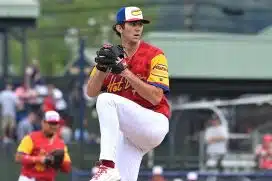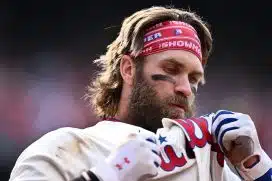By Matt Rappa, Sports Talk Philly editor
As announced Tuesday afternoon, Philadelphia Phillies franchise hits leader Jimmy Rollins is back with the organization as a special advisor.
Rollins, 40, played 15 seasons with the Phillies from 2000 to 2014, slashing .267/.327/.424 with 479 doubles, 111 triples, 216 home runs, 887 RBI, 453 stolen bases and 753 walks spanning 2,090 games and 9,511 plate appearances. Since retiring from baseball after playing just 41 games with the Chicago White Sox in 2016, Rollins has made baseball television appearances as an analyst, however he always kept a look out to return to Major League Baseball in some capacity.
"Last spring training, I met with [Matt] Klentak and [Executive Vice President] Dave Buck just to go over getting back involved with the organization," Rollins said during a SportsRadio 94 WIP appearance on Wednesday. "I sat down for breakfast and they just basically said, 'let us know what you want to do … if you want to get involved in any capacity, let us know and we'll consider it and go from there.'
"They had the chance to think about it, I had the chance to think about it and we agreed to a certain number of days, just to get a flavor and make sure it's something I want to do. Obviously, why wouldn't I?"
Jimmy Rollins is here in Miami. Here's here to talk to the #Phillies about pennant races and early-career struggles. https://t.co/xpMso1eusC
— Todd Zolecki (@ToddZolecki) September 5, 2018
Rollins first got a chance to see whether he would like the special advisor role last September, when he met with the Phillies during their road series against the Miami Marlins. The four-time Gold Glove Award winner donned red pinstripes for the first time since 2014 in part thanks to Gabe Kapler, who thought Rollins' "perspective as a Phillies icon, a World Series champion, a guy that has been through this on every level, would be good" for the team.
"It was a little weird being back in the clubhouse on this side of it. I talked to a couple of guys and hung out with them," Rollins said. "I was like, 'yeah, this is something I want to do; just being around and hopefully bring a little bit of that winning flavor back.'"
As special advisor, Rollins will have duties "on both the baseball and business sides of the Phillies' operation," according to MLB.com's Todd Zolecki, including "Spring Training coaching, meeting with sponsors and suite holders, fan engagement and community outreach."
Rollins joked that he will be playing "a lot of golf and hanging out with the sponsors," and that in spring training, he will "work with the guys" and just be there as "an ear." "[I will be] a guy that can give them some advice about adversities, advice about playing in the city, and just what to except," Rollins said. "Also, [I will] hopefully [get] them in the right mind frame of what it's like to win."
What It Takes to Win
"You just don't show up and win. Winning starts with the belief first. Then, you have to go out and perform. The more you perform, the better you hit, the more you actually can win. You also have to understand that winning is not about the one person in the batter's box in that moment. It's about passing the baton. The next guy has to do his job.
Although they are all individual actions at one time, without everybody else, you're not going to win. Bottom line. You can't be a selfish player. Obviously, in that moment, be selfish. When you're in that box, you want that hit … when you're on the mound, you want that strikeout, or make the pitch … when the ball comes your way on the defensive side, you want to make that play. Yes, in those moments, be selfish, but understand that leadership is more important than the talent. If you have talent with great leadership, then you're going to win.
[I will] just try to develop all those attitudes with the guys that are there."
Coming Together as a Team
"They have the talent. I don't think there's a lack of talent there. … Obviously, you have a World Series champion [Gabe Kapler] in the clubhouse. You have guys that have been around, but you don't bring that all together in one year. It takes being together, around each other through the battles, highs and lows … seeing who people really and understand strengths and weaknesses. Once you start doing that, then you can really figure out who you are and where you are.
Talent is there. They definitely have the talent. It's just a matter of them: learning how to play, getting pissed off enough to be like, 'I don't want to go home anymore … I'm tired of coming in second place or third place.' Once you develop those characteristics as a team, then you can become that much better. Even if it just starts with one person, that's a leader … Once those things start to happen, not just breaking your bats on strikeouts or all those little things and being accountable every single step of the way … that's when you start seeing the core and character of the team come together. Then, the guys come together and really become who they should be."
Necessary Mentality for Potential Phillies Bryce Harper and Manny Machado
"For superstar players coming into the city, Jim Thome would be the model. He came in from Cleveland with all the glory that he had. Going to a new place and leaving a place he was comfortable winning divisions; although [the Indians] didn't win the World Series, he was a big part of all of that … He came to Philly and went right to work. He didn't let his star get in the way of what was most important: trying to win a championship there in Philadelphia.
Anybody that comes there understanding that you're not bigger than the city …. when you go there, you're almost like renting the uniform. You're representing the city but you don't own that uniform. That belongs to the people of Philadelphia and they will let you know if you're one of them or not. You have to work for that. You can't come in there like …'bow down to me, this is who I am.' … You have to earn it all over again. Great, we're glad you're here and we know your past, but we want you to see you do it in this uniform and make sure you earn those stripes."
Analytics Should Be Left as a ‘Tool’
"During [Kapler's] playing days, he had been studying analytics of baseball … he's going to want to try to put the best team forward. Me, personally, I think analytics are a tool, and that's what they should be left at as … a tool. One think I loved about Charlie [Manuel], is he understood that what numbers would say, but if he had a gut feeling, he went with it.
What he did, by doing that, was build confidence in the guys … it doesn't matter what the situation says, it matters that Charlie has been paying attention to the way you've been playing, swinging, or whatever … and he thinks you're the right guy in this moment. If you're hot, he's going to keep playing you.
In today's game, it's more about the numbers than it is the guy. There's no guarantee just because you have bad numbers against a guy that today isn't your day to change that. Of course, in analytics, they're going to take all that into consideration. More than likely, you can lose a star player that day or a couple of days just because of the numbers. What you're saying to your star player is that, 'it doesn't matter how good you are, you're not better than the numbers.'"







